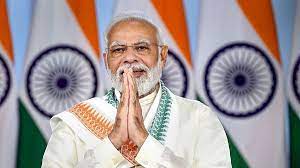Together, India and France will forward discussions for a binding instrument to end plastic pollution
On Friday, India and France pledged to work constructively with other nations that share their views to forward talks for a global law to eradicate plastic pollution. Following discussions between Prime Minister Narendra Modi and French President Emmanuel Macron at this location, the two nations agreed to work together to address the pollution caused by single-use plastic items. This commitment includes a ban on single-use plastic products with a high potential for littering and low usefulness.
India and France noted that plastic product pollution brought on by discarded and improperly handled plastic trash is a serious environmental problem that has to be addressed immediately. It has a harmful effect on ecosystems in general and marine ecosystems in particular.
The UN Environment Programme (UNEP) describes single-use plastic items as “an umbrella term for different types of products that are typically used once before being thrown away or recycled” and include food packaging, bottles, straws, containers, cups, cutlery, and shopping bags.
The two nations claimed that efforts to combat plastic pollution on a worldwide scale had achieved progress in a joint agreement outlining their commitment to the elimination of single-use plastic product pollution.
The Basel Convention’s annex amendments to address the problem of transboundary movement of plastic waste, the marine litter action plans under the regional seas conventions, and the International Marine Organization (IMO) action plan for marine litter from ships are notable actions, according to the document.
The issue has also been covered in a number of UNEA resolutions since 2014, and in order to find possible solutions, UNEA3 created the ad hoc open-ended expert group on marine litter (AHEG) in 2017. On November 13, 2020, it came to a conclusion, outlining a number of possible responses, including the creation of “definitions of unnecessary and avoidable use of plastic, including single-use plastic.”
The two parties agreed that there is a need to reduce, in particular, our usage of single-use plastic goods and to think about other options.
The 4th United Nations Environment Assembly (UNEA-4) adopted a resolution in March 2019 on “Addressing Single-Use Plastic Products Pollution” that “encourages member states to take actions, as appropriate, to promote the identification and development of environmentally friendly alternatives to single-use plastic products, taking into account the full life cycle implications of those alternatives”, according to the document.
According to the two nations, low-utility single-use plastic goods should gradually be phased out in favor of reusable items based on a circular economy strategy. Dealing with this problem may open up new chances for innovation, competitiveness, and job growth, they said. Solutions are available and have been clearly recognized.
Solutions, according to India and France, include a ban on specific single-use plastic products where alternatives are easily accessible and reasonably priced, extended producer responsibility (EPR) to hold producers accountable for environmentally sound waste management, promoting reuse, prescribing a minimum level of recycling of plastic packaging waste, and using recycled plastic content.
France and India reaffirmed their resolve to gradually cut down on and eventually stop producing and using certain single-use plastic goods, and they listed numerous actions they had already done to reduce plastic pollution.







